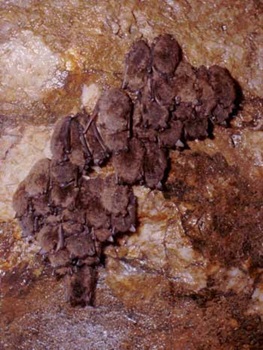Batty About Bats!
Bats are flying mammals that navigate by sound (echolocation). They emit sounds which bounce back as echoes. An echo can tell a bat where an insect or any other object is located.
Beneficial Bats
- Bats are important predators of night-flying insects.
- Many tropical bats pollinate plants and help spread seeds.
- Bat droppings, or guano, can be used as fertilizer.

Some bats spend the winter in underground caves. These little brown bats were photographed hibernating in Connecticut.
Bat Buffet
What do bats eat? Many eat insects. Some bat species in other countries eat fruit or nectar, and even fish. Vampire bats, which live in Central and South America, feed on animal blood. What do Connecticut bats eat? Insects. What do all young bats eat? Like all mammals, young bats feed on their mother's milk.
Activity: Bat and Moth Game
Have you ever played "Marco-Polo" in the swimming pool? This game is very similar but is played on land. One person is the bat and another is the moth. Both must stand in a circle made by other players. The bat is blindfolded. The moth must say "moth" every time the bat says "bat". The object of the game is for the bat to rely only on sound and tag the moth.
Activity: Anatomy of a Bat
Bats belong to the scientific order Chiroptera, which means "hand wing". This illustration shows the bat's wing, which is actually a web of skin stretched between the "fingers" of its hands.

True of False?
- Bats are blind.
- Bats get into your hair.
- All bats have rabies.
White-Nose Syndrome
White-nose syndrome (WNS) is a disease that affects hibernating bats and is caused by a fungus, Pseudogymnoascus destructans, or Pd for short. Sometimes Pd looks like a white fuzz on bats’ faces, which is how the disease got its name. Pd grows in cold, dark, and damp places. It attacks the bare skin of bats while they are hibernating. As it grows, Pd causes changes in bats that make them become active more than usual and burn up fat they need to survive the winter. Bats with white-nose syndrome may do strange things like fly outside in the daytime in winter. There is no cure for WNS, but scientists from all over the world are working together to study the disease, how it spreads and infects bats, and what we can do to control it.
What You Can Do to Help
Build and install a bat house (directions)
Resources on Bats
Several websites provide additional information on bats and bat activities:
White-Nose Syndrome Response Team
Bats in Connecticut (report bat sightings)
Bat Week, an annual, international celebration of the role of bats in nature (October 24-31)
Celebrating Bats, A Cookbook of Goodies and Treats Made with Bat-dependent Ingredients
A Teacher's Guide to the Project EduBat Bat Mural
Bat Conservation International, an international nongovernmental organization working to conserve the world's bats and their habitats through conservation, education, and research efforts.
Recovering America's Wildlife Act -- #RecoverWildlife
Answers to Quiz: All are false and also some of the greatest myths about bats. Most bats can see well, but rely more on sound than sight. Because a bat can find something as small as a tiny insect, it certainly can detect something as large as you and your hair and avoid them. Like all mammals, bats can get rabies, but only a few do. Unlike many other mammals, bats with rabies seldom become aggressive.
Content last updated in February 2023.

